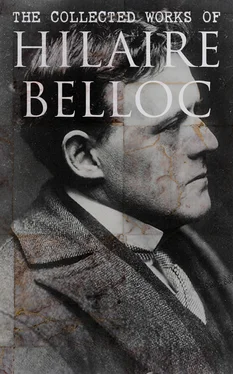All the village sang, knowing the psalms very well, and I noticed that their Latin was nearer German than French; but what was most pleasing of all was to hear from all the men and women together that very noble good-night and salutation to God which begins--
Te, lucis ante terminum.
My whole mind was taken up and transfigured by this collective act, and I saw for a moment the Catholic Church quite plain, and I remembered Europe, and the centuries. Then there left me altogether that attitude of difficulty and combat which, for us others, is always associated with the Faith. The cities dwindled in my imagination, and I took less heed of the modern noise. I went out with them into the clear evening and the cool. I found my cigar and lit it again, and musing much more deeply than before, not without tears, I considered the nature of Belief.
Of its nature it breeds a reaction and an indifference. Those who believe nothing but only think and judge cannot understand this. Of its nature it struggles with us. And we, we, when our youth is full on us, invariably reject it and set out in the sunlight content with natural things. Then for a long time we are like men who follow down the cleft of a mountain and the peaks are hidden from us and forgotten. It takes years to reach the dry plain, and then we look back and see our home.
What is it, do you think, that causes the return? I think it is the problem of living; for every day, every experience of evil, demands a solution. That solution is provided by the memory of the great scheme which at last we remember. Our childhood pierces through again ... But I will not attempt to explain it, for I have not the power; only I know that we who return suffer hard things; for there grows a gulf between us and many companions. We are perpetually thrust into minorities, and the world almost begins to talk a strange language; we are troubled by the human machinery of a perfect and superhuman revelation; we are over-anxious for its safety, alarmed, and in danger of violent decisions.
And this is hard: that the Faith begins to make one abandon the old way of judging. Averages and movements and the rest grow uncertain. We see things from within and consider one mind or a little group as a salt or leaven. The very nature of social force seems changed to us. And this is hard when a man has loved common views and is happy only with his fellows.
And this again is very hard, that we must once more take up that awful struggle to reconcile two truths and to keep civic freedom sacred in spite of the organization of religion, and not to deny what is certainly true. It is hard to accept mysteries, and to be humble. We are tost as the great schoolmen were tost, and we dare not neglect the duty of that wrestling.
But the hardest thing of all is that it leads us away, as by a command, from all that banquet of the intellect than which there is no keener joy known to man.
I went slowly up the village place in the dusk, thinking of this deplorable weakness in men that the Faith is too great for them, and accepting it as an inevitable burden. I continued to muse with my eyes upon the ground ...
There was to be no more of that studious content, that security in historic analysis, and that constant satisfaction of an appetite which never cloyed. A wisdom more imperative and more profound was to put a term to the comfortable wisdom of learning. All the balance of judgement, the easy, slow convictions, the broad grasp of things, the vision of their complexity, the pleasure in their innumerable life--all that had to be given up. Fanaticisms were no longer entirely to be despised, just appreciations and a strong grasp of reality no longer entirely to be admired.
The Catholic Church will have no philosophies. She will permit no comforts; the cry of the martyrs is in her far voice; her eyes that see beyond the world present us heaven and hell to the confusion of our human reconciliations, our happy blending of good and evil things.
By the Lord! I begin to think this intimate religion as tragic as a great love. There came back into my mind a relic that I have in my house. It is a panel of the old door of my college, having carved on it my college arms. I remembered the Lion and the Shield, _Haec fuit, Haec almae janua sacra domus._ Yes, certainly religion is as tragic as first love, and drags us out into the void away from our dear homes.
It is a good thing to have loved one woman from a child, and it is a good thing not to have to return to the Faith.
They cook worse in Undervelier than any place I was ever in, with the possible exception of Omaha, Neb.
LECTOR. Why do you use phrases like _'possible exception'?_
AUCTOR. Why not? I see that all the religion I have stuck into the book has no more effect on you than had Rousseau upon Sir Henry Maine. You are as full of Pride as a minor Devil. You would avoid the _cliché_ and the commonplace, and the _phrase toute faite_. Why? Not because you naturally write odd prose--contrariwise, left to yourself you write pure journalese; but simply because you are swelled and puffed up with a desire to pose. You want what the Martha Brown school calls 'distinction' in prose. My little friend, I know how it is done, and I find it contemptible. People write their articles at full speed, putting down their unstudied and valueless conclusions in English as pale as a film of dirty wax--sometimes even they dictate to a typewriter. Then they sit over it with a blue pencil and carefully transpose the split infinitives, and write alternative adjectives, and take words away out of their natural place in the sentence and generally put the Queen's English--yes, the Queen's English--on the rack. And who is a penny the better for it? The silly authors get no real praise, not even in the horrible stucco villas where their clique meet on Sundays. The poor public buys the _Marvel_ and gasps at the cleverness of the writing and despairs, and has to read what it can understand, and is driven back to toshy novels about problems, written by cooks. 'The hungry sheep,' as some one says somewhere, 'look up and are not fed;' and the same poet well describes your pipings as being on wretched straw pipes that are 'scrannel'--a good word.
Oh, for one man who should write healthy, hearty, straightforward English! Oh, for Cobbett! There are indeed some great men who write twistedly simply because they cannot help it, but _their_ honesty is proved by the mass they turn out. What do you turn out, you higglers and sticklers? Perhaps a bad triolet every six months, and a book of criticism on something thoroughly threadbare once in five years. If I had my way--
LECTOR. I am sorry to have provoked all this.
AUCTOR. Not at all! Not at all! I trust I have made myself clear.
Well, as I was saying, they cook worse at Undervelier than any place I was ever in, with the possible exception of Omaha, Neb. However, I forgave them, because they were such good people, and after a short and bitter night I went out in the morning before the sun rose and took the Moutier road.
The valley in which I was now engaged--the phrase seems familiar--was more or less like an H. That is, there were two high parallel ranges bounding it, but across the middle a low ridge of perhaps a thousand feet. The road slowly climbed this ridge through pastures where cows with deep-toned bells were rising from the dew on the grass, and where one or two little cottages and a village already sent up smoke. All the way up I was thinking of the surfeit of religion I had had the night before, and also of how I had started that morning without bread or coffee, which was a folly.
When I got to the top of the ridge there was a young man chopping wood outside a house, and I asked him in French how far it was to Moutier. He answered in German, and I startled him by a loud cry, such as sailors give when they see land, for at last I had struck the boundary of the languages, and was with pure foreigners for the first time in my life. I also asked him for coffee, and as he refused it I took him to be a heretic and went down the road making up verses against all such, and singing them loudly through the forest that now arched over me and grew deeper as I descended.
Читать дальше












